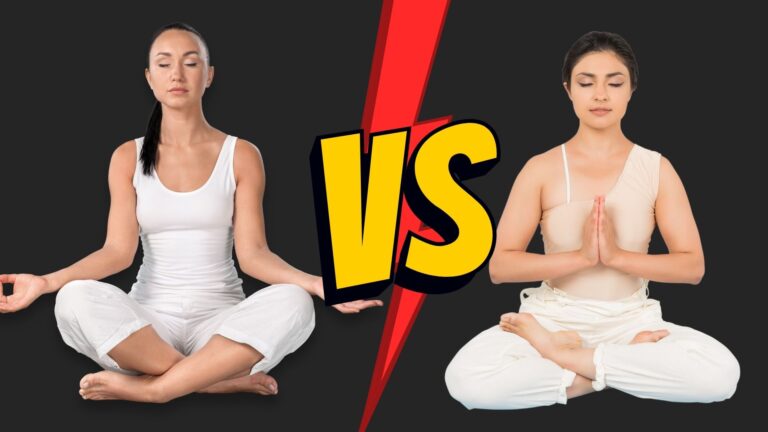Mindfulness and meditation are often used interchangeably, but they are distinct practices with different purposes and techniques. While both promote mental well-being and emotional balance, it’s important to understand their unique qualities to use them effectively. Knowing the difference between mindfulness and meditation can help you incorporate both practices into your life in a way that suits your needs and goals.

What Is Mindfulness?
Definition and Origins
Mindfulness is the practice of being fully present and engaged in the current moment. It has roots in Buddhist traditions but has gained popularity worldwide as a tool for improving mental and emotional health. The essence of mindfulness is focusing your attention on the present without judgment or distraction.
The Key Elements of Mindfulness
Mindfulness involves cultivating awareness of your thoughts, emotions, and physical sensations in real-time. Key components include non-judgment, acceptance, and awareness. You can practice mindfulness during any activity, whether it’s eating, walking, or simply breathing.
How Mindfulness Can Be Practiced in Daily Life
Unlike meditation, mindfulness doesn’t require dedicated time or a quiet space. You can practice mindfulness at any moment, simply by bringing your full attention to whatever you’re doing. Whether you’re sipping your morning coffee or walking in nature, mindfulness invites you to be fully present.

What Is Meditation?
Definition and Origins
Meditation is a formal practice that involves training the mind to focus and redirect thoughts. It has been practiced for thousands of years in various cultures, often as part of spiritual or religious practices. Meditation typically requires sitting quietly for a set period, focusing on the breath, a mantra, or a visualization.
Different Types of Meditation
There are many forms of meditation, including mindfulness meditation, transcendental meditation, loving-kindness meditation, and guided meditation. Each has its own unique focus and techniques, but they all aim to cultivate a calm and focused mind.
The Core Components of Meditation Practice
Most meditation practices involve finding a quiet space, sitting comfortably, and focusing on the breath or another object of attention. Meditation encourages letting go of distractions and cultivating a sense of inner peace. It typically requires more time and structure than mindfulness practices.
Mindfulness vs. Meditation: Key Differences
Focus and Intention
Mindfulness is about being aware of the present moment, whether you’re actively doing something or not. Meditation, on the other hand, involves a specific focus, such as the breath or a mantra, and is often practiced in a seated or lying-down position.
Duration and Frequency
Mindfulness can be practiced informally throughout the day, while meditation usually requires a set time and space. Meditation sessions often last from 10 to 30 minutes or more, while mindfulness can be as brief as a few seconds.
Formal vs. Informal Practice
Meditation is a more formal, intentional practice that typically involves setting aside time to focus on mental training. Mindfulness can be integrated into everyday activities without needing to stop what you’re doing.
How Mindfulness Relates to Meditation
Mindfulness as a Form of Meditation
Mindfulness is often considered a type of meditation, specifically “mindfulness meditation,” where the focus is on being aware of the present moment. While meditation generally requires a dedicated time, mindfulness can be practiced anytime.
Incorporating Mindfulness into Meditation Practices
Many meditation practices incorporate elements of mindfulness. For example, during mindfulness meditation, you might focus on your breath while also remaining aware of passing thoughts and sensations.
The Overlap Between the Two
Both mindfulness and meditation foster awareness and self-reflection, though meditation typically requires more time and structure. Mindfulness can be practiced within meditation, but it can also stand alone as a simple practice of present-moment awareness.

Benefits of Mindfulness
Enhancing Awareness and Presence
Mindfulness improves your ability to stay present and focused on the task at hand, whether it’s work, a conversation, or even an enjoyable activity like cooking.
Reducing Stress and Anxiety in Everyday Situations
By focusing on the present moment, mindfulness helps reduce the tendency to ruminate on past regrets or future worries, which is a common cause of stress and anxiety.
Improving Emotional Regulation
Mindfulness can help you recognize and manage your emotions more effectively. By practicing non-judgmental awareness, you can respond to emotions without becoming overwhelmed by them.

Benefits of Meditation
Promoting Mental Clarity and Focus
Meditation enhances concentration and helps declutter the mind, allowing for greater mental clarity. This focus extends beyond meditation sessions and can improve productivity and problem-solving skills.
Deepening Inner Peace and Relaxation
Regular meditation encourages deep relaxation and inner peace, providing a much-needed mental break from the hustle and bustle of daily life.
Cultivating a More Balanced Mindset
Meditation helps develop a calm, balanced outlook on life by training the mind to stay centered, even in challenging situations. This leads to improved emotional stability and resilience.
FAQs
Can I practice mindfulness without meditating?
Yes, mindfulness doesn’t require meditation. It can be practiced in everyday activities by simply paying attention to the present moment.
How long should I meditate each day to see benefits?
Even 10-15 minutes of meditation a day can yield significant benefits, such as increased focus, reduced stress, and improved emotional well-being.
Can mindfulness and meditation help with mental health issues?
Yes, both practices have been shown to reduce symptoms of anxiety, depression, and stress by promoting emotional regulation and mental clarity.
Is one practice better than the other for beginners?
It depends on your goals. Mindfulness is easier to integrate into daily life, while meditation may require more commitment but offers deeper relaxation and mental training over time.


